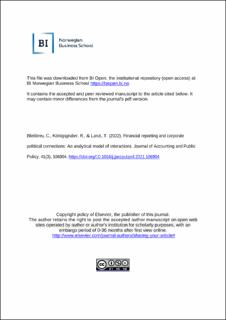Financial reporting and corporate political connections: An analytical model of interactions
Journal article, Peer reviewed
Accepted version
Permanent lenke
https://hdl.handle.net/11250/3082276Utgivelsesdato
2021Metadata
Vis full innførselSamlinger
Originalversjon
10.1016/j.jaccpubpol.2021.106904Sammendrag
We analyze the interactions between accounting institutions and corporate political connections (CPCs). We present a model where a costly policy depends on the perceived economic condition of a firm. This policy and the valuation of the firm by capital market participants create incentives for the firm to manipulate its financial reports. A politician has some discretion over the policy and can use it to favor a connected firm. Our analysis reveals that the firm’s financial reporting is determined by the interplay of an accounting standard, enforcement strictness, and the salience of the policy for the firm. The possibility to manipulate the financial reports imposes an upper boundary on the value of political connectedness which does not exist if only truthful reporting is possible. The reason is that a low credibility of reported figures leads only to a weak revision of the policy. In general, the value of CPCs is highest when the financial reporting regime evenly splits between firms in good and bad economic condition. Our analysis further suggests that while connected firms generally report being in good condition more often than non-connected firms do, the effect of CPCs on absolute reporting manipulation depends on policy salience. If policy salience is low, connected firms exhibit a higher absolute degree of manipulation than non-connected firms do; the opposite holds if policy salience is high.

